isaac asimov and the old solar system
[ + links to: Asimov on Jupiter - Asimov on Jupiter: Response - Lucky Starr, Space Ranger ]

Asimov's fiction is most renowned for its dramatization of ideas - in particular, those springing from robotics and psychohistory. Cerebral rather than sensual, lacking the swashbuckling colour of the Burroughs/Brackett scenarios, the blazing vision of C S Lewis or the poetic cadences of Arthur C Clarke, the Asimovian imagination would seem unsuited to adventure in the lush Old Solar System - and yet, "Ike" has something going for him as an OSS writer.
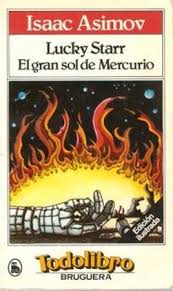
...there was a hairline that was the Sun. It was an unbearable line of light edging a notch of broken rock on the horizon, as though some celestial painter had outlined the gray stone in brilliant white.
Lucky looked backward. Across the uneven ground that lay behind him there were the splotches of prominence-red. But now, just at his feet, there was a wash of white, catching crystal formations in glinting highlights.
He moved on again, and the line of light became first a small splotch and then a larger one.
The boundary of the Sun was clearly visible, lifting a bit above the horizon in its center, curving gently down on each side. The curve was awesomely flat to one whose eyes were accustomed to the curvature of Earth's Sun.
Nor did the Sun's blaze drown out the prominences which crawled along its edge like flaming red snakehair...
- Lucky Starr and the Big Sun of Mercury
Harlei: Cerebral and sensual, I'd say, Zendexor!
world by world
For references to the worlds in Asimov's tales - our correspondent Dylan has compiled the list. To read it, just click here! (This has saved me quite a bit of work.)
playing around in the ammonia
Stid: If you choose the best bits, you can make a case for Asimov as a significant storyteller for the Old Solar System. But personally I reckon that if you do that, you're going to risk disappointing some readers. All right, the bit you quoted just above sounds promising, but just suppose, Zendexor, that an OSS fan, on the strength of that Mercury snippet, rushes to buy the "Lucky Starr" books - what will he/she think when approaching Titan, for example?
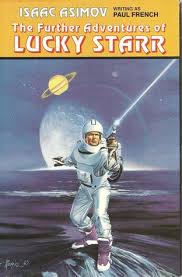
The surface of Titan was losing some of the atmosphere-induced blankness. They could make out mountain rangers now; not the sharp, craggy peaks of an airless world, but the softened ranges that showed the effects of wind and weather. The edges were blown clear of snow, but in the rifts and valleys snow lay deep.
"Not snow, really," said Lucky, "frozen ammonia."
All was desolate, of course. The rolling plains between the mountain rangers were either snowy or rock-bare. No life of any kind appeared. No rivers or lakes. And then -
"Great Galaxy!" said Lucky.
A dome had made its appearance...
- Lucky Starr and the Rings of Saturn
And that's that. Dome, settlers, human foes, human conflict. No more on the actual character of the world that the adventure is happening on. A perfunctory Titan! What can possibly make up for this lack of feel for place? I suggest, Zendexor, that the Lucky Starr books are likely to disappoint your fan base...
Zendexor: Harlei's jumping up and down. I'm going to let him make his point, and then I have one to make too.
Harlei: If Zendexor is choosing the best bits, Stid, you are slanting things the other way, choosing the most inadequate bits. It so happened that Lucky Starr had too much on his mind at Titan, that's all... whereas Io is a bit different -
Stid: Ah yes, go ahead and give us the high jinks on Io! Lucky Starr and his childish side-kick Bigman are, we're told, the first humans ever to land on Io - even though we're also informed that in Lucky Starr's time the Space Age is a thousand years old!
Zendexor: Separate issue, Stid. The chronology of human development given in the Lucky Starr series is admittedly problematic, but we can accept it for now. Go on with your quote, Harlei. And when you're done, I shall return us to Titan - for some unfinished business there (pace Stid!).
Harlei: Right, here goes, and bear in mind that Bigman Jones' childishness has an exploratory point; by which I mean, his antics bring to light aspects of the situation which wouldn't ever become explicit if all were left to his wiser boss.
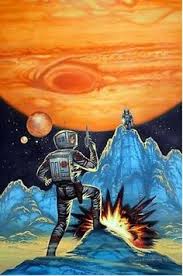
They were passing over a drift of snowlike material, glittering in Jupiter light, and Bigman looked down upon it in amazement.
"This thing melts if you look at it," he said. He picked some up in his gauntleted hand, and it melted down and ran off like butter on a stove. He looked back, and where the three had stepped were deep indentations.
Lucky said, "It's not snow, it's frozen ammonia, Bigman. Ammonia melts at a temperature eighty degrees lower than ice does, and the heat radiating from our suits melts it that much faster."
Bigman lunged forward to where the drifts lay deeper, gouging holes wherever he stepped, and shouted, "This is fun."
Lucky called, "Make sure your heater is on if you're going to play in the snow."
"It's on," yelled Bigman, and running down a ridge with long low leaps, he flung himself headlong into a bank. He moved like a diver in slow motion, hit the drifted ammonia, and, for a moment, disappeared. He floundered to his feet.
"It's like diving into a cloud..."
- Lucky Starr and the Moons of Jupiter
Stid: So all right, on Io we get a little bit more than we do in the Titan excerpt. Instead of a mere glance at frozen ammonia, we get to play about in it. But is it enough to do justice to a world?
emotional compensation
Zendexor: Let's admit, shall we, that Asimov's OSS is comparatively sparse and bleak. He is no Stanley Weinbaum, to regale us with fascinating life-forms on every world to which he takes us -
Harlei: Though actually, on three of his worlds, namely Mercury, Venus and Mars, there is native life, and on Mars it's intelligent life!
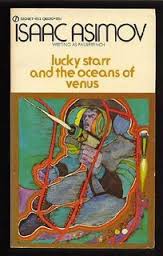
Zendexor: True - and intelligent or not, it's always interesting. Besides, there's a lot more to the OSS Asimov than the Lucky Starr books which we've concentrated on so far. On the topic of intelligent aliens alone, he provides us with his Jovians - for which see our page Asimov on Jupiter - and his life-forms in the Asteroid Belt - for which see our page on silicon life. These are inventions of a high order: excellent reading.
But my main defence of Asimov's status as a contributor to the OSS must relate to plot rather than background.
And at this stage I want to say that the Lucky Starr series belongs to a special category of mine, which includes such diverse works as the Gone with the Wind, The Andromeda Strain and the James Bond novels...
Stid and Harlei together: Wow.
Stid: That's some category. Er... somewhat diverse.
Zendexor: The connecting link is actually quite simple: all three works I've just mentioned are ones which surprised me on reading. I mean to say, before reading them, I had heard about them, and had acquired a markedly wrong impression of what they would be like. For example I expected Gone with the Wind to be sentimental and nostalgic, whereas it isn't; I expected James Bond to be sadistic, and Bond little more than an assassin, whereas in fact he is resolutely averse to killing in cold blood. (I was also ignorant of Fleming's skill as a writer.) As for The Andromeda Strain, I was quite unprepared for its author's peculiar ability to draw excitement from what I might call "organizational" fiction; his matter-of-fact build-ups (reminding me a bit of the novels of Nevil Shute).
When we come to consider the adventures of Lucky Starr, I feel likewise impelled to say, I never expected what I got. Never expected, for example, that the cerebral Asimov would be so darned good at fights...
So maybe it's time to enlarge our opinions.
Stid, you challenged me to say what could compensate us for Asimov's perfunctory treatment of place, for his minimal evocation of the character of a world.
For the answer, let's return to the scene on Titan. This is the scene which you so roundly criticized for lack of depth and colour.
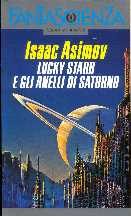
My defence is - it does have depth and colour, but emotionally, not materially!
Asimov makes the Titan episode memorable as a scene of terrific human drama. Villainy, raw hatred, tension and excitement bespatter the area with emotional colour. That's how it impresses us: so that our minds dwell, not in its geographical sparseness, but on its significance as a venue, the scene of Lucky's encounter with the Sirian base -
Stid: Ah, but wait, this brings up another problem. A Sirian base! Another drain on the OSS aspect! Consider - can these stories really fit properly in an Old Solar System sub-genre, when their plots are so often centred around a conflict whose source is interstellar?
Harlei: You're dodging around a lot today, Stid. No sooner has Zendexor dealt with one of your objections -
Zendexor: - than up pops another. But this one will have to wait. You've raised a major issue, Stid, too big to deal with on this page which already has enough themes to contend with. I intend to explore the relation of OSS with interstellar themes on another page. For the time being, I'll just point out that although humanity has spread among the stars, that spread is thin; our species' centre of population remains here in Sol's System, and that's where the action of all the stories takes place - Sirian opponents notwithstanding.
And the action and the suspense are pretty impressive. The Lucky Starr books are supposed to be juveniles, and indeed this is apparent in some aspects of their tone, and in the fact that the protagonists behave with decency - but there's nothing "juvenile" in the unfolding of the mysteries that Lucky Starr has to face. The ingenuity of his detection and the expert manner in which the author misdirects the reader and holds his surprise conclusions in reserve are the equal of any adult mysteries I have ever read.
statesmanlike hero
Stid: I would like Lucky more if he had some interesting flaws. He's in danger of being too perfect, in my opinion.
Harlei: Too bad he hasn't been divorced three times and weaned off drugs - then you'd like him more, I expect.
Zendexor: Now now, Harlei, I'm the one who does the digs around here. At first sight Stid's point may seem valid, but actually, though Lucky doesn't have any interesting flaws, neither is he too far on the way to being invulnerable - he gets into some tough fights and some really tight spots.
Moreover, he has one interesting and not very common virtue. Apart from physical courage, cunning and high intelligence, which you'd expect from a hero, he is also statesmanlike in his respect for the achievements of the foe. Bigman doesn't see it that way. For him, loyalty means 100% partisanship.

Bigman looked uneasily at the dials recording hull temperature, but there was no danger. The robot at the controls was sure-handed. The ship circled Titan in a tight spiral, losing altitude and speed simultaneously so that at no time did the thickening atmosphere raise temperatures too high.
Again Lucky glowed with admiration. "It will manage it without fuel at all. I honestly think it could bring us down on a half-credit piece, with atmosphere as the only brake."
Bigman said, "What's good about that, Lucky? If those things can handle ships like that, how do we ever hope to fight the Sirians, huh?"
"We'll just have to learn to build our own, Bigman. Those robots are a human achievement. The humans that did the achieving are Sirians, yes, but they are human beings, too, and all other humans can share pride in the achievement. If we fear the results of their achievement, let's match it ourselves or more than match it. But there's no use denying them the worth of their accomplishment."
- Lucky Starr and the Moons of Saturn
Harlei: I suppose Stid is going to say that this sounds like preaching.
Zendexor: He'd better not. The passage comes at just at the right moment of tension in the power-play between Sirians and Terrans, and besides, it's refreshing for me - I get sick of the resentment shown towards today's successful peoples, whether it be the Americans, the Jews or the Germans who get unpopular as the end result of being hard-working and capable.
Stid: No argument there, I assure you. I like the tone in Asimov's books. Only, the more I like it, the more I expect to see you struggle as you try to fit it all into your rather dreamily romantic OSS framework. Despite all you say, you're working "against the grain" on this page.
Zendexor: In some respects, maybe. Your position, I take it, is that a cerebral, "monochrome" writer like Asimov has nothing much to give us. Except the largely emotional colour of the Lucky Starr series... and the other few tales, especially those of the detective Wendell Urth, which enlarge our OSS vision to a modest degree.
But here are two points to widen this view:
the glow in the picture
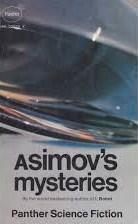
First, his Wendell Urth story The Singing Bell is a masterly example of how one can add character to a world through depiction not of native life but of inanimate objects peculiar to that world. You might not think you could get enthused by the geology of the Moon, but this story is something special, as well as being a riveting character study.
"Lifeless" scenes are full of life, in a way. Great authors like C S Lewis (with his packed "empty" space) and Arthur C Clarke can show us this; and in The Singing Bell Asimov joins that select company, if only briefly.
Second - and here is my conclusion about Asimov's literary power as a whole, not just concerning the OSS - he "makes a picture of his view of truth". What do I mean by this? I mean, that his great limitation - his confinement to rationalism, his lack of spiritual vision or romantic dreamlike madness - ceases to be a limitation when one gives it a right-angled turn, so to speak, taking it down from its ceiling to hang it on our wall, as a picture on a par with other pictures.
I see an analogy in French history. The Light of Reason in seventeenth-century France, so useless as a guide to reality, becomes valuable as a cute hat to wear. All you need to do, to admire the picture, is to cease to take the idea at its face value, and take it at the far higher value of its stylistic character. Rationality in other words can be picturesque. Reason and clarity shed a glow over all of France, in superbly inconsistent mingling with the quite unreasonable panache of Dumas' characters. In short, I like rationalism. It's no good as a philosophy, but in the right hands it can be a tonic to a tale.
Stid: Sounds like you're a relativist at heart, Zendexor.
Zendexor: No, I am not a relativist. Ideologically I am on the side of religious writers, as I believe that no model of reality can plausibly omit transcendence. However, other ideologies can be taken as pictures, to feed the imagination with fuel cells for narrative power.
That's what happens with Asimov. His powerful-though-monistic intellect gives us good adventures. He would never have understood why an S M Stirling would want to write of a "retro" Venus in The Sky People or a Robert Gibson a "retro" Mercury in Valeddom; but I wouldn't want to change his tales one bit.
Isaac Asimov, the Lucky Starr series: David Starr - Space Ranger (1952); Lucky Starr and the Pirates of the Asteroids (1953); Lucky Starr and the Oceans of Venus (1954); Lucky Starr and the Big Sun of Mercury (1956); Lucky Starr and the Moons of Jupiter (1957); Lucky Starr and the Rings of Saturn (1958); all published in one volume as The Complete Adventures of Lucky Starr (2001); "The Callistan Menace" (Astonishing Stories, April 1940); "The Singing Bell" (The Magazine of Fantasy and Science Fiction, January 1955); "The Talking Stone" (The Magazine of Fantasy and Science Fiction, October 1955); Michael Crichton, The Andromeda Strain (1969); Robert Gibson, Valeddom (2013); Margaret Mitchell, Gone with the Wind (1936); S M Stirling, The Sky People (2006)
See also the page Asimov on Jupiter.
For discussion of Asimov by our contributor Dylan, see Lucky Starr - Space Ranger and Asimov on Jupiter Response. For The Talking Stone, see the page on silicon life. For The Callistan Menace see the page on Callisto. See also the Moon page for The Singing Bell.
For the latent spiritual power in Nemesis, see Gibson and Asimov on the fullness of empty where I draw a comparison with Man of the World. For previous remarks on Nemesis see the Diary for 12th November 2016. For an admission of error see the Diary for 25th November 2017.
See the OSS Diary for 26th March 2017 for a story idea arising from comments about the origin of the asteroids, in Lucky Starr and the Pirates of the Asteroids.
For The Callistan Menace see the Callisto page and also the extract, Giant Callistan Caterpillars.
For The Dead Past see Hope against hope.
For The Key see the Gazeteer entry on Clavius.
For The Dying Night see the Gazetteer entry for Lower Falls.
Fictional dates:
For Liar! see 2021.
For I,Robot see 2032 and 2044.
See the Deeds page for 1935.
More extracts: Make your own sunrise on Mercury - A snowy glitter on Mercury - Stranded on a far-future radioactive Earth - Cavern-city on Mars - Contrasting views of Venus - Looking down at Vesta from orbit - Stalking a spiny critter on Ganymede - An ammonia river on Io - Problems of siting an observatory on Ceres.
>> Authors































